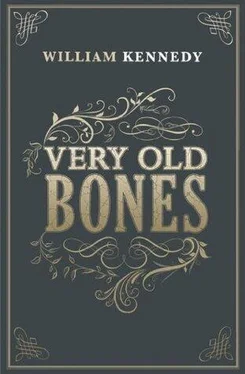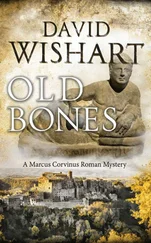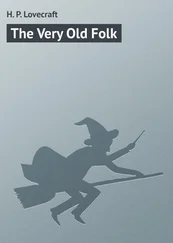One.
I turned the page.
The things we do when we’re alone.
In the year after Molly and I fell in love with each other’s failed love, I could at last say without equivocation that I had acquired a family, although a failing one. Sarah and Tommy passed on, Molly fell into her melancholy, and my father, mad with art, and obsessed with his imagery of pernicious life — this rage of creative excess being the condition to which he had aspired all his artistic career — nearly died of a heart attack. That attack reduced him to part-time madman, immobilized and weak, but insistent on working an hour a day, at least. It was because of his condition, and Molly’s, that I eventually moved down from Saratoga to become magister of the Phelan house on Colonie Street.
Sarah died first. Molly encountered the beginnings of her sister’s decline upon her return from her and Tommy’s Labor Day visit with Giselle and me at the Grand View. She found the interior of the Colonie Street house in total darkness at late afternoon, every window barricaded against the light by black drapes Sarah had nailed to the walls. Sarah had also unplugged all lamps, and removed all bulbs from the ceiling fixtures Peter had installed twenty years earlier. Molly found her in her room, sitting in her chair reading, by the light of a solitary candle, an old yellowed newspaper. Sarah seemed not to hear Molly enter the bedroom, but when she saw her she folded the newspaper and put it in the drawer of her bedside table. Then she blew out the candle, moved onto the bed, and pulled the covers up to her chin.
“What happened, Sarah?” Molly asked. “Are you sick?”
“You left me alone,” Sarah said.
“I asked you to come with us. We went to Saratoga.”
“I know where you went.”
“Billy helped me bring Tommy’s wheelchair into the house. He’s downstairs. Don’t you want to say hello? Don’t you want to see Tommy?”
“No. You left me alone,” Sarah said, and that’s all she said for two days.
Billy and Molly plugged in the lamps, put the bulbs back in the chandeliers, pulled the nails out of the drapes and woodwork, some of which had splintered, the first serious damage to it since the house was built seventy-five years earlier. As Molly was trying to understand what could have possessed Sarah to do such a thing, she realized that being left by herself was reason enough; for it came to Molly that never in her life had Sarah spent one night alone in this house. Molly knew that she herself could be alone forever, would be alone forever, with or without other people, and that it wouldn’t kill her; intensify the sadness she was never without, yes; but I am not going to die from such a thing, is how she put it when we talked about Sarah.
The decline of Sarah seemed uncharacteristically abrupt. We all thought she would struggle more vigorously against the cabal of forces that had beset her, but we misread her plan. All her strength and will centered on the downward rush to death, and she clenched her jaws against even minimal nourishment, ripping out of her arms the tubes that carried the life-sustaining fluids Dr. Lynch had ordered for her. She had a deadline for her death. She calculated her weakness until it was the equivalent of a newborn: helpless, pulled into a realm not of its own choosing, the newborn and the imminently moribund bound for an encounter at the symbiotic boundary of life and death. And she died two hours into November 17, 1954, her mother’s ninety-fourth birthday.
Sarah left explicit instructions for her wake. She was to be laid out in the same style dress that Kathryn Phelan wore to her grave, and in the same style coffin, which was to be placed in the same position in the front parlor. A solemn high funeral mass should be said for her, as with Kathryn Phelan, and with Father Mahar, the pastor, to be the celebrant. She left the bankbook of the family savings account in the drawer of her bedside table, and it revealed a balance of $840.22. Sarah had no bank account of her own. What little money she earned sewing she always deposited to the family account.
Molly did not find the newspaper Sarah had put in the bedside drawer, nor had it been thrown away. Molly resolved to search for it when the funeral was over. She also chose to countermand Sarah’s request for the ancestral dress.
“She’ll wear her good Sunday dress,” Molly said. “I won’t have us a laughing stock, people thinking we’re old-fashioned.”
Tommy saw Ben Owens and another man carrying Sarah’s body down the front stairs and out to the waiting hearse.
“What’re they doing, Molly?” Tommy asked.
“They’re taking Sarah,” Molly said.
“Where they taking her?”
“To the funeral home,” Molly said, and she sat down beside Tommy on the sofa. “Sarah died, Tom.”
“She did?”
“She died this morning.”
“Will they bury her?”
“Yes, they will.”
“Why’d she die?”
“She was sad,” Molly said.
“What was she sad about?”
“Oh a lot of things, Tom.”
“Is she dead? Really, really dead?”
“Yes.”
“I didn’t think she’d die.”
“Neither did I.”
“Will you die, Moll?”
“Some day.”
“How about me? Will I die?”
“I hope not.”
“Me too,” Tommy said. “I don’t think I wanna die.”
Molly called Peter and he said he’d be up the next day. When she called Peg to tell her the news Peg immediately came down and helped clean the house. I also came down after Molly called me, and made plans to stay over through the funeral.
Ben Owens brought Sarah home at early evening. There would only be one night of waking, the two-night wake going the way of gaslight and woodstoves. Molly had ordered two pieces of flowers and had them delivered immediately, which I found odd, for surely they’d look fresher if they were delivered the day of the wake. We imposed order and polish on the house, then ate the turkey sandwiches Peg brought for us. When Peg went home Molly put Tommy to bed, and then she and I sat alone in the back parlor, I expecting the full story behind Sarah’s death. But Molly only sat with her hands folded in her lap, still wearing her kitchen apron, staring at the coffin in the front parlor.
“I should do it now,” she said. “I may not have another chance after Peter gets here.”
“Chance for what? What should you do now?”
“Bury my baby,” she said. “Put him in hallowed ground.”
“Jesus, Moll, are you sure? You want to go back and relive that whole thing?”
“I relive it every day of my life,” she said.
“You mean you want Ben Owens to go down the cellar and dig up the bones and buy a grave and have a mass and all that? It could turn into a police matter. Can you seriously want that?”
“That’s not what I want. Do you love me the way you did the night we danced?”
“I do, Moll,” I said, “I think it’s a permanent condition.”
“I thought so. That’s why I want you to dig up the baby for me.”
Access to the cellar was through a trapdoor in the kitchen floor. The stairway was of narrow, warped boards, without a banister, and one achieved the bottom either in darkness or with a flashlight. The place had obviously been designed by a lunatic, the foundation a crazy collage of brick and field-stone, the dirt floor never leveled, the place never wired for electricity, despite the former need for access to the now defunct coal furnace (oil now heated the house). The cellar gave off the cloistered odor of coal dust, dry earth, and crumbling mortar from the foundation walls, which were in a decrepitude parallel to that of the denizens of this house. Dozens of empty jelly and Ball jars lay in boxes on shelves, and beside them dusty rows of pickled cauliflower, tomatoes, onions, preserved fruit and jellies, and I wondered were these still edible, and how long had they survived in this dismal grotto?
Читать дальше












